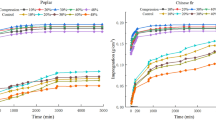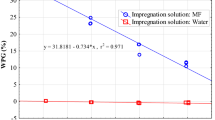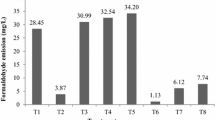Abstract
The effects of molecular weight of PF resin on the deformation behaviour of NaClO2 treated resin-impregnated wood during compression were investigated. Blocks of Japanese cedar were subjected to 2% NaClO2 aqueous solution. This was repeated up to four times resulting in a weight loss of 28%. Treated and untreated samples were impregnated with PF resin having different molecular weight. With increasing molecular weight, weight gain and volume gain decreased for untreated PF resin-impregnated wood, while NaClO2 treated wood impregnated with high molecular weight PF resin showed almost double the weight gain compared to untreated condition. NaClO2 treatment has shown considerable potential for high compression of PF resin-impregnated wood at lower pressing pressure regardless of the molecular weight of the resin. Low to high molecular weight resin was shown to penetrate into NaClO2 treated wood as estimated by weight gain contributing to the plasticization of cell wall considerably and thus resulting in cell wall collapse at low pressing pressure. The density of NaClO2 treated wood impregnated with high molecular weight resin attained a value of over 0.8 g/cm3 which is close to the density of untreated wood impregnated with low molecular weight resin. Such compressed wood exhibited high dimensional stability after boiling for 3 h. Thus, the penetration of resin into wood contributes to highly compressed dimensional stable resin-impregnated wood at low pressing pressure.


Similar content being viewed by others
References
Anwar UMK, Paridah MT, Hamdan H, Sapuan SM, Bakar ES (2009) Effect of curing time on physical and mechanical properties of phenolic treated bamboo strips. Ind Crop Prod 29:214–219
Deka M, Saikia CN (2000) Chemical modification of wood with thermosetting resin: effect on dimensional stability and strength property. Bioresour Technol 73:179–181
Furono T, Imamura Y, Kajita H (2004) The modification of wood by treatment with low molecular weight Phenol-formaldehyde resin: a properties enhancement with neutralized phenolic resin and resin penetration into wood cell walls. Wood Sci Technol 37:349–361
Gindl W, Zargar-Yaghubi F, Wimmer R (2003) Impregnation of softwood cell walls with melamine-formaldehyde resin. Bioresour Technol 87:325–330
Inoue M, Norimoto M, Otsuka Y, Yamada T (1991) Surface compression of coniferous Lumber III. Permanent set of the surface compression layer by a water solution of low molecular weight phenolic resin. Mokuzai Gakkaishi 37(3):234–240
Kajita H (1992) Report of grant in aid for scientific research (no: 01560193) from the Ministry of Education, Japan
Kajita H, Mukudai J (1991) Improvement of particleboard properties by impregnation of phenolic resin—effect of resin molecular weight. International Symposium on chemical modification of wood, Kyoto, Japan
Ryu JY, Takahashi M, Imamura Y, Sato T (1991) Biological resistance of phenol-resin treated wood. Mokuzai Gakkaishi 37(9):852–858
Shams MI, Yano H (2004) Compressive deformation of wood impregnated with low molecular weight phenol formaldehyde (PF) resin II Effects of processing parameters. J Wood Sci 50:343–350
Shams MI, Yano H (2009) A new method for obtaining high strength phenol formaldehyde (PF) resin impregnated wood composites at low pressing pressure. J Trop Sci 21:175–180
Shams MI, Yano H, Endou K (2004) Compressive deformation of wood impregnated with low molecular weight phenol formaldehyde (PF) resin I. Effects of pressing pressure and pressure holding. J Wood Sci 50:337–342
Shams MI, Yano H, Endou K (2005) Compressive deformation of wood impregnated with low molecular weight phenol formaldehyde (PF) resin III Effects of sodium chlorite treatment. J Wood Sci 51:234–338
Stamm AJ, Seborg SM (1955) Forest products laboratory resin-treated laminated compressed wood (Compreg). Forest Product Lab. Report 1381 Rev
Yano H (2001) Potential strength for resin impregnated compressed wood. J Mat Sci Lett 20:1127–1129
Yano H, Hirose A, Inaba S (1997) High strength wood based materials. J Mat Sci Lett 16:1906–1909
Yano H, Hirose A, Collings PJ, Yazaki Y (2001) Effects of removal of matrix substances as a pretreatment in the production of high strength resin impregnated wood based materials. J Mat Sci Lett 20:1125–1126
Acknowledgments
The authors would like to thank Gui-E-Chemical Industry Ltd. for supplying different types of phenol formaldehyde (PF) resins. M. I. Shams acknowledges the financial support of the JSPS Postdoctoral Fellowship for Foreign Researchers from the Japan Society for the Promotion of Science.
Author information
Authors and Affiliations
Corresponding author
Rights and permissions
About this article
Cite this article
Shams, M.I., Yano, H. Compressive deformation of phenol formaldehyde (PF) resin-impregnated wood related to the molecular weight of resin. Wood Sci Technol 45, 73–81 (2011). https://doi.org/10.1007/s00226-010-0310-1
Received:
Published:
Issue Date:
DOI: https://doi.org/10.1007/s00226-010-0310-1




